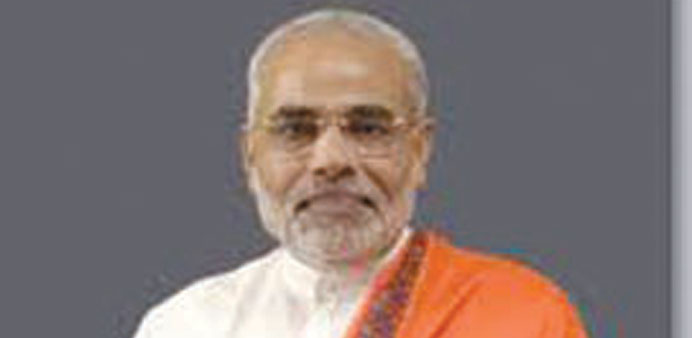Agencies/New Delhi
Prime Minister Narendra Modi met with the Hindu nationalist group Rashtriya Swayamsevak Sangh (RSS) yesterday to discuss his government, in a move that highlighted the organisation’s influence but drew criticism from the opposition.
The RSS is the ideological parent of Modi’s Bharatiya Janata Party (BJP) but tensions have surfaced between the two groups in recent months over some of the government’s economic and social policies. Modi spent his formative years as a full-time volunteer in the RSS.
The three-day meet between the RSS and the BJP in New Delhi was to discuss India’s fiscal policy, internal security, foreign policy, defence deals and education, RSS leaders said. It was billed as a way to improve the working relationship between the two.
“Several members of the RSS are now ministers, and it is obvious that the RSS wants to know about their action plan on crucial policy matters,” said Dattatreya Hosabale, joint general secretary of the RSS.
“RSS can only provide inputs to the government. It will never dictate policies to the BJP lawmakers,” Hosabole said.
Modi’s attendance was criticised by the opposition Congress party.
“It is shocking that a constitutionally elected government is being held captive to the diktats of an extra constitutional, divisive and fascist organisation,” Congress spokesman Randeep Singh Surjewala said.
The RSS rejects such labels and says it is a non-political organisation.
However, it has swiftly moved from the fringes of Indian society to the epicentre of power, lending its cadres to the BJP during elections and increasingly influencing government rhetoric and policy.
During the meeting, RSS leaders offered feedback to ministers and BJP leaders on the government’s performance, RSS leaders said. The ministers are expected to take that into account while tweaking policy.
Hosabale the Modi government had raised the aspirations and hopes of the people as never before and created a sense of confidence both within and outside the country.
“That is the most welcome thing” about the government, he said.
The RSS veteran rejected Congress criticism that the RSS was acting like a remote control of the ruling coalition.
“Those who remote controlled (the government) have no moral right to talk about remote control.”
Replying to a question that ministers were violating the oath of secrecy by reporting to the RSS, he said: “We are not an illegal organisation. We are also citizens of the country.
Hosabale said he and his colleagues told the government that India needed to go for an economic model suited to it instead of aping the West which was facing a grave economic crisis.
“These days people are rushing to cities from villages in search of work, education and healthcare. The government should provide these facilities in villages. We need an economic model where people remain happily in villages,” he said.
“The RSS thinks the government is working in the right direction. They are sincere. The RSS is satisfied,” Hosabole said.
Trade unions and farmers’ groups affiliated to the RSS strongly opposed Modi’s early attempts to amend labour and land laws, forcing the government to rethink its strategy.

